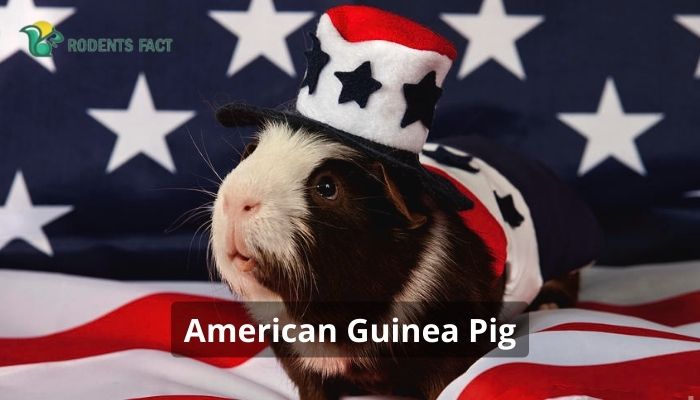American Guinea Pig: Facts, History, Personality, Care, Diet, and Health Issues
Whenever the topic of guinea pigs as pets is brought up in the United States, the American guinea pig breed often comes to mind. American Cavy Breeders Association recognizes many breeds of cavies, but the smooth-coated shorthaired cavies are among the oldest and most popular.

The American guinea pig’s short coat, sturdy body, and bright, curious eyes may not make it the most exotic-looking cavy. Despite this, they are one of the most often kept pets because of their amiable and easygoing nature.
The American guinea pig is a mellow and social rodent. It is lively, enthusiastic, and possessive. They will not harm a fly and are safe to keep around infants and toddlers. Since they are social creatures that thrive in groups, it is usually not a problem to house many of them together.
American Guinea Pig Facts

A few interesting facts about the American guinea pig that not everyone knows.
| Length | 8 – 19 inches |
| Weight | 700 – 1200 grams |
| Lifespan | 4 – 8 years |
| Colors | Beige, cream, black, red, gold |
| Temperament | Active, friendly, and economical breed of guinea pig |
| Best Suited For | Families and inexperienced pet owners |

One of the earliest domesticated guinea pig breeds, the shorthaired guinea pig is a popular pet. It is also a familiar mental image when people think of guinea pigs, making it a top breed. The American guinea pig breed was initially shown with two other breeds, as the American Cavy Breeders Association noted.
American guinea pigs are among the top three most sought-after varieties. It comes in various colors and sizes (from 1 to 3 pounds)! These lovable critters thrive when surrounded by a colony of their kind. They are somewhat healthy, too, but they do need controlled environments.
In addition to its many color variations, the American guinea pig is distinguished by its straight fur. Although a guinea pig with American ancestry may be patriotic, “American” refers to the country of origin rather than a specific breed. This kind is known as the “English guinea pig” in some regions.

Like a brick, the American’s body is solid and rectangular. All guinea pigs are the same in this regard. All guinea pigs have a few defining characteristics, including a rounded snout like a Roman nose, small legs, and big, round ears. Generally, guinea pigs weigh between 4 and 7 kilograms (9 and 16 pounds).
History Of American Guinea Pig

The guinea pig’s original range included most of what is now Peru, Bolivia, and Chile in South America, near the Andes Mountains. The species is genetically similar to Cavia tschudii, a wild guinea pig.
The domestication event happened between 4,000 and 7,000 years ago. The guinea pig was domesticated and used for food and fur. Around the middle to late 16th century, European explorers, including the Spanish Conquistadors, transported them back to Europe.
In the early 1900s, guinea pigs made their way to the United States. Guinea pigs are mostly kept as household pets or occasionally exploited in research settings outside South America.

Commonly known as “cavies,” the rodent species Cavia porcellus may be traced back to South America, particularly the Andes Mountains. These small rodents were tamed throughout antiquity, and by 5000 BC, they were seen in art. A short time later, they traveled to Europe, where they hung out with modern-day celebrities, presidents, and the monarchy.
The American Guinea pig is the original and standard pet pig. Domestication likely began in the Andes about 5000 BC, according to experts. The Tschudi Guinea Pigs of South America are the ancestors of the American Guinea Pig breeds.
Later, guinea pigs made their way to Europe, where they quickly became popular among royalty like Queen Elizabeth I.
Size

Depending on the breed, American guinea pigs may weigh anywhere from 700 to 1,100 grams (around 1.5 to 2.5 pounds) (ADW). Their lengths vary between 8 and 10 inches (20.3 and 25.4 cm), and they are short and cylindrical.
Male guinea pigs are also generally taller than a female guinea pigs. Length at full size can range from 8 to 12 inches.
Appearance

All guinea pigs, including the American breed, have a firm, cylindrical body, short, stocky legs, and round ears, giving them the appearance of a hairy potato.
The American guinea pig as well as its near relative, the American Satin, are possibly the most well-known types of guinea pig in the world.
The eyes are positioned on the edges of their heads, and the ears on their heads are tiny and fashioned like petals.
They have tiny mouths in the shape of a triangle and have 20 teeth. As with other rodents, Guinea pigs must continually chew or gnaw to prevent their teeth from becoming too long.
Hair color, texture, coat shine, and pattern variation all set these breeds apart.
American Guinea Pig Colors

More than 20 colors of American guinea pigs are recognized for displayed by the American Rabbit Breeders Association, which is an associate of the American Cavy Breeders Association.
These colors are categorized into five categories as follows: (beige, black, chocolate, lilac, cream, red, red-eyed orange, white), Group of Solids (brindle, roan, golden solid, dilute solid, silver solid), Agouti group (dilute agouti, golden agouti, silver agouti).
The group with Spots (include broken-color, Himalayan, tortoiseshell, Dalmatian, Dutch, tortoiseshell & white, and Tan) (black, blue, chocolate, lilac).
How Rare Are Black Squirrels? Know where you can find them.
American Guinea Pig Characteristics

In addition to being active and friendly, American guinea pigs are also quite cute. They are less nervous than other guinea pigs, however. Just make sure you are always meeting their minimum standards.
First, it is recommended that you purchase two guinea pigs of the same gender or have one of your guinea pigs. Otherwise, you could just wind up with a litter of piglets. It is well knowledge that guinea pigs like communal settings.
Having another guinea pig as a companion around increases their lifespan and improves their health.

But if you insist on bringing two pigs home, get them neutered. However, if they continue to argue, the situation might get dangerous. More than three intact males should not be housed together since fights would inevitably break out.
Guinea pigs are sometimes abandoned and later given up to a shelter or rescue group. Because guinea pigs may be easily stressed by abrupt change, it may be best to keep the pig alone in this situation.
To determine what is best, consult your veterinarian and the rescue coordinator.
The American Guinea Pig Personality

Because of its low maintenance needs and calm demeanor, the American guinea pig makes a great pet. Each caviar has its distinct character, but cavies generally are lively, bright, curious, and fun.
Even more so than with other animals, a piglet us level of extroversion as an adult depends on how well it was socialized as a youngster.
The American guinea pig is regarded as a pleasant pet and one of the most friendly guinea pig species. They are bright and observant, have a passion for adventure, and thrive on communication with their human companions.
Remember that domesticated guinea pigs, like their wild ancestors, are social herd animals that benefit from having a partner. Keeping a single pig on its own may be detrimental to its mental and physical health due to isolation, boredom, and sadness.
American Guinea Pig Lifespan

The average American guinea pig lives for around five to seven years. Only a handful of guinea pigs kept in captivity have reached the incredible age of 14.
Diet, water, a clean environment, enrichment, exercise, and preventive vet care are vital to guinea pig longevity.
How Do You Care about An American Guinea Pig?

A guinea pig’s needs include clean, roomy housing, healthy food, entertainment, socialization, and preventative medical attention.
Keeping American guinea pigs requires some special attention to detail. The key to keeping your cavy healthy and happy, and making it do the happy wheel and popcorn dance, is to learn its requirements and preferences.
Cage Size
American guinea pigs are tiny, yet they need a large enclosure so that they may run about and socialize with their peers. If you are wondering how large of a cage is appropriate for your pig, the answer is “bigger is better”
The guinea pig(s) will require its own space in the house, so make sure it is big enough! Much more floor space is needed in the horizontal plane than in the vertical.
Bedding, hay racks, food and drink dishes, hiding spots, games, litter boxes, and litter are all necessary additions to their environment.
Once the cage is set up, the guinea pigs have plenty of room to go about it.
The ideal guinea pig cage would provide space for the pets to run about and interact and private areas for resting and sleeping.

Hutch Set Up
The perfect hutch setup is also crucial. Hay is a favorite of cavies. They will graze on it all day and then snuggle up with it to sleep. Make sure the hay you provide your guinea pigs is clean and dust-free.
Food and water dishes, bottles of water, shelters, nesting materials, and goods safe for use around animals are other necessary additions to the hutch.
This article provides comprehensive details on constructing a suitable home for your American guinea pigs.
Diet

Hay is a staple in all guinea pigs’ diets, as previously indicated. However, they also need lots of fresh vegetables and fruit and pellets or nuggets that are high in fiber and include added nutrients. But be careful—guinea pigs love sweet things, but certain fruits could be too high in sugar.
Rapid weight gain and subsequent health issues may result from this.
Most importantly, guinea pigs should be fed clean, fresh hay. It should constitute the bulk of a guinea pig’s diet. Vitamin C and good drinking water are two more needs.
Vitamin C is essential for the health of guinea pigs, yet they can not produce it themselves. The pellets designed for guinea pigs often include this vital nutrient.
Grooming
Guinea pigs need more than just a yearly exam at the vet to ensure their health and well-being. Maintaining a tidy appearance is essential to your health. Nails are less likely to overgrow and cause discomfort if they are trimmed regularly.
Brushing once a week allows you to do a brief self-check. Unusual eye, ear, mouth, nose, anus discharge, tumors, or weird scents necessitate a guinea pig-savvy vet.
Providing a healthy diet is another way to reduce health issues. The dietary fiber in hay is essential. Guinea pigs’ ever-expanding teeth become worn down by eating hay.
Exercise

Most of a guinea pig’s day is spent running, searching for food, and playing. The RSPCA reports that these animals remain awake for 20 hours straight, sleeping for just a few minutes here and there.
We advise providing them with a run of sufficient size so they may spend time outside of their hutch or indoor cage and receive the exercise they need.
Your guinea pig is not just a pet but also a plaything!
Health Complications With the American Guinea Pigs
In comparison to other guinea pigs, American guinea pigs tend to live the longest. But it is still susceptible to pneumonia, diarrhea, and scurvy, just like every other guinea pig.

Pneumonia
VCA Hospitals reports that American guinea pigs are vulnerable to developing pneumonia. Many guinea pigs carry the bacteria that cause pneumonia for years without showing any illness.
Take your pet to the doctor immediately if it is not eating, has drainage from the eyes and nose, or has difficulty breathing.
Diarrhea
Since their digestive tract is so fragile. The American guinea pigs are continuously at risk of diarrhea. Even a slight change in American guinea pig food might trigger an attack.
Health complications from diarrhea need prompt medical intervention. Taking your pet to the doctor is essential if it develops symptoms like diarrhea, sudden weight loss, or severe dehydration.

Scurvy
Both people and guinea pigs, may get scurvy if they do not get enough Vitamin C. Because guinea pigs can not make their Vitamin C as most other animals can, they need humans to ensure they get enough.
We advise taking your pet to the doctor if you observe any concerning changes in their behavior, such as an unusually rough coat, diarrhea, unwillingness to move, or swollen feet
Urinary Problems
All guinea pigs, often have issues related to their urinary system.
Your guinea pig may experience pain from bladder stones caused by the calcium. In addition to causing excruciating agony or even death, bladder stones that get stuck in the urethra can not be passed. Watch for signs including stooped posture, frequent urination, and blood in the urine.
Skin Issues

Guinea pigs are susceptible to bacterial and fungal skin illnesses and parasites.
Guinea pigs, like other animals, are easy to parasites, including fleas, lice, and ringworm. Due to this, your pig’s skin may become irritated, crusty, scaly, and eventually bald.
Be cautious about finding an experienced exotic vet before bringing an American guinea pig into your house. Antibiotics and other drugs that are generally well tolerated by mammals may be given to guinea pigs without any adverse effects.
Respiratory
Guinea pigs are susceptible to respiratory infections, including pneumonia. The germs that cause respiratory sickness are often found in pigs, which is why this is the case. Anxiety in your pig might activate the bacteria.

Digestive
Diarrhea is a frequent health issue caused by stress, an imbalance in the intestinal flora, or certain bacterial infections. Diarrhea can be potentially lethal if left untreated or handled incorrectly.
Sedentary pigs, particularly those confined in inadequate housing, are prone to weight gain and health problems associated with obesity. However, the fundamental cause of obesity is overfeeding and an improper diet.
Dental
Guinea pig teeth are referred to by veterinarians as “open-rooted.” This ensures that your pig’s ears will remain at a constant length throughout its life. Teeth may get too long if they are not regularly exercised by biting and chewing on anything. Injury and infection to the gums, both internal and external, are typical results.
Abscesses and Tumors
An abscess forms when an infection causes tissue swelling. Abscesses may occur in any part of a guinea pig’s body, but the mouth is a general site for infection.
Cancers of the skin, mammary glands, and other tissues are common in guinea pigs. Even though they are mostly harmless, it is best to get them removed just in case.

Frequently Asked Questions
1. What Is the Average Lifespan of American Guinea Pigs?
American guinea pigs live 5 to 8 years longer than other breeds. Of course, food, exercise, and genetics have a part. Give your cavy the most excellent care to guarantee a long, healthy life.
2. How Big Do American Guinea Pigs Get?
Fully grown American guinea pigs average 10 to 12 inches or 30 cm. The size of boars and sows depends on their birth order and genetics.

3. Is an American Guinea Pig Friendly?
American guinea pigs are friendly. They are intelligent, interested, and adore connecting with people. They appreciate friendship and flourish in pairs or groups.
4. Do American Guinea Pigs Get Along With Other Animals?
Its extroverted disposition makes it good with other animals. However, for your pet’s comfort and peace, we advise closely monitoring any social interactions with other animals (and small humans).
5. Do American Guinea Pigs Bite?
This guinea pig breed seldom bites. Friendly and curious, they prefer munching hay to biting. When threatened or agitated, any cavie will nip or bite. Handle your cavy carefully to prevent injury.

Final Words
Trendy pets nowadays are American guinea pigs. The American guinea pig is a sweet, social pocket pet that flourishes with preventive medical care, decent food, and fresh water. They also require a loving owner, like YOU.
Popular American Guinea Pig breeds are easy to care for. Short hair is low-maintenance. Nothing beats hugging a soft, fuzzy guinea pig. Any new pet is a commitment. However, only you can decide whether this is the right moment to give your guinea pig a fresh start.




